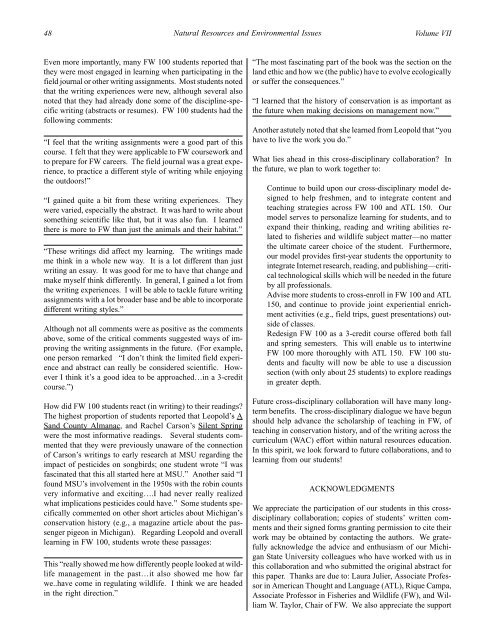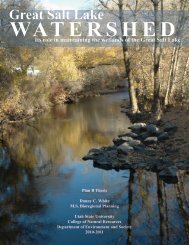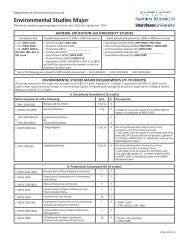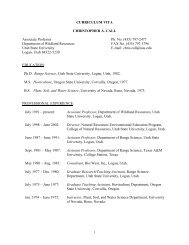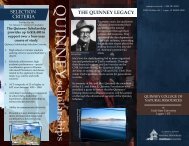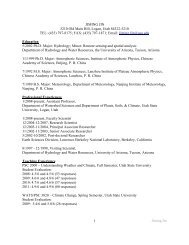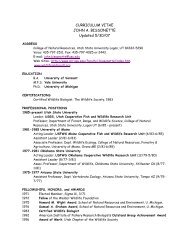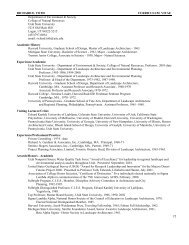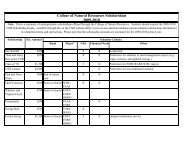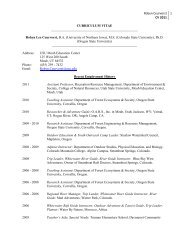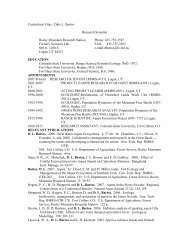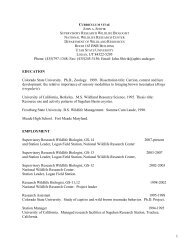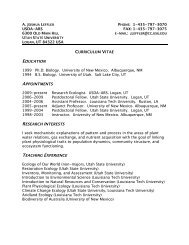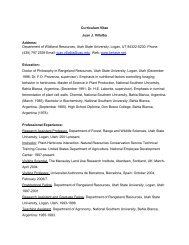University Education in Natural Resources - CNR Home - Utah State ...
University Education in Natural Resources - CNR Home - Utah State ...
University Education in Natural Resources - CNR Home - Utah State ...
You also want an ePaper? Increase the reach of your titles
YUMPU automatically turns print PDFs into web optimized ePapers that Google loves.
48 <strong>Natural</strong> <strong>Resources</strong> and Environmental Issues Volume VII<br />
Even more importantly, many FW 100 students reported that<br />
they were most engaged <strong>in</strong> learn<strong>in</strong>g when participat<strong>in</strong>g <strong>in</strong> the<br />
field journal or other writ<strong>in</strong>g assignments. Most students noted<br />
that the writ<strong>in</strong>g experiences were new, although several also<br />
noted that they had already done some of the discipl<strong>in</strong>e-specific<br />
writ<strong>in</strong>g (abstracts or resumes). FW 100 students had the<br />
follow<strong>in</strong>g comments:<br />
“I feel that the writ<strong>in</strong>g assignments were a good part of this<br />
course. I felt that they were applicable to FW coursework and<br />
to prepare for FW careers. The field journal was a great experience,<br />
to practice a different style of writ<strong>in</strong>g while enjoy<strong>in</strong>g<br />
the outdoors!”<br />
“I ga<strong>in</strong>ed quite a bit from these writ<strong>in</strong>g experiences. They<br />
were varied, especially the abstract. It was hard to write about<br />
someth<strong>in</strong>g scientific like that, but it was also fun. I learned<br />
there is more to FW than just the animals and their habitat.”<br />
“These writ<strong>in</strong>gs did affect my learn<strong>in</strong>g. The writ<strong>in</strong>gs made<br />
me th<strong>in</strong>k <strong>in</strong> a whole new way. It is a lot different than just<br />
writ<strong>in</strong>g an essay. It was good for me to have that change and<br />
make myself th<strong>in</strong>k differently. In general, I ga<strong>in</strong>ed a lot from<br />
the writ<strong>in</strong>g experiences. I will be able to tackle future writ<strong>in</strong>g<br />
assignments with a lot broader base and be able to <strong>in</strong>corporate<br />
different writ<strong>in</strong>g styles.”<br />
Although not all comments were as positive as the comments<br />
above, some of the critical comments suggested ways of improv<strong>in</strong>g<br />
the writ<strong>in</strong>g assignments <strong>in</strong> the future. (For example,<br />
one person remarked “I don’t th<strong>in</strong>k the limited field experience<br />
and abstract can really be considered scientific. However<br />
I th<strong>in</strong>k it’s a good idea to be approached…<strong>in</strong> a 3-credit<br />
course.”)<br />
How did FW 100 students react (<strong>in</strong> writ<strong>in</strong>g) to their read<strong>in</strong>gs?<br />
The highest proportion of students reported that Leopold’s A<br />
Sand County Almanac, and Rachel Carson’s Silent Spr<strong>in</strong>g<br />
were the most <strong>in</strong>formative read<strong>in</strong>gs. Several students commented<br />
that they were previously unaware of the connection<br />
of Carson’s writ<strong>in</strong>gs to early research at MSU regard<strong>in</strong>g the<br />
impact of pesticides on songbirds; one student wrote “I was<br />
fasc<strong>in</strong>ated that this all started here at MSU.” Another said “I<br />
found MSU’s <strong>in</strong>volvement <strong>in</strong> the 1950s with the rob<strong>in</strong> counts<br />
very <strong>in</strong>formative and excit<strong>in</strong>g….I had never really realized<br />
what implications pesticides could have.” Some students specifically<br />
commented on other short articles about Michigan’s<br />
conservation history (e.g., a magaz<strong>in</strong>e article about the passenger<br />
pigeon <strong>in</strong> Michigan). Regard<strong>in</strong>g Leopold and overall<br />
learn<strong>in</strong>g <strong>in</strong> FW 100, students wrote these passages:<br />
This “really showed me how differently people looked at wildlife<br />
management <strong>in</strong> the past…it also showed me how far<br />
we..have come <strong>in</strong> regulat<strong>in</strong>g wildlife. I th<strong>in</strong>k we are headed<br />
<strong>in</strong> the right direction.”<br />
“The most fasc<strong>in</strong>at<strong>in</strong>g part of the book was the section on the<br />
land ethic and how we (the public) have to evolve ecologically<br />
or suffer the consequences.”<br />
“I learned that the history of conservation is as important as<br />
the future when mak<strong>in</strong>g decisions on management now.”<br />
Another astutely noted that she learned from Leopold that “you<br />
have to live the work you do.”<br />
What lies ahead <strong>in</strong> this cross-discipl<strong>in</strong>ary collaboration? In<br />
the future, we plan to work together to:<br />
• Cont<strong>in</strong>ue to build upon our cross-discipl<strong>in</strong>ary model designed<br />
to help freshmen, and to <strong>in</strong>tegrate content and<br />
teach<strong>in</strong>g strategies across FW 100 and ATL 150. Our<br />
model serves to personalize learn<strong>in</strong>g for students, and to<br />
expand their th<strong>in</strong>k<strong>in</strong>g, read<strong>in</strong>g and writ<strong>in</strong>g abilities related<br />
to fisheries and wildlife subject matter—no matter<br />
the ultimate career choice of the student. Furthermore,<br />
our model provides first-year students the opportunity to<br />
<strong>in</strong>tegrate Internet research, read<strong>in</strong>g, and publish<strong>in</strong>g—critical<br />
technological skills which will be needed <strong>in</strong> the future<br />
by all professionals.<br />
• Advise more students to cross-enroll <strong>in</strong> FW 100 and ATL<br />
150, and cont<strong>in</strong>ue to provide jo<strong>in</strong>t experiential enrichment<br />
activities (e.g., field trips, guest presentations) outside<br />
of classes.<br />
• Redesign FW 100 as a 3-credit course offered both fall<br />
and spr<strong>in</strong>g semesters. This will enable us to <strong>in</strong>tertw<strong>in</strong>e<br />
FW 100 more thoroughly with ATL 150. FW 100 students<br />
and faculty will now be able to use a discussion<br />
section (with only about 25 students) to explore read<strong>in</strong>gs<br />
<strong>in</strong> greater depth.<br />
Future cross-discipl<strong>in</strong>ary collaboration will have many longterm<br />
benefits. The cross-discipl<strong>in</strong>ary dialogue we have begun<br />
should help advance the scholarship of teach<strong>in</strong>g <strong>in</strong> FW, of<br />
teach<strong>in</strong>g <strong>in</strong> conservation history, and of the writ<strong>in</strong>g across the<br />
curriculum (WAC) effort with<strong>in</strong> natural resources education.<br />
In this spirit, we look forward to future collaborations, and to<br />
learn<strong>in</strong>g from our students!<br />
ACKNOWLEDGMENTS<br />
We appreciate the participation of our students <strong>in</strong> this crossdiscipl<strong>in</strong>ary<br />
collaboration; copies of students’ written comments<br />
and their signed forms grant<strong>in</strong>g permission to cite their<br />
work may be obta<strong>in</strong>ed by contact<strong>in</strong>g the authors. We gratefully<br />
acknowledge the advice and enthusiasm of our Michigan<br />
<strong>State</strong> <strong>University</strong> colleagues who have worked with us <strong>in</strong><br />
this collaboration and who submitted the orig<strong>in</strong>al abstract for<br />
this paper. Thanks are due to: Laura Julier, Associate Professor<br />
<strong>in</strong> American Thought and Language (ATL), Rique Campa,<br />
Associate Professor <strong>in</strong> Fisheries and Wildlife (FW), and William<br />
W. Taylor, Chair of FW. We also appreciate the support


